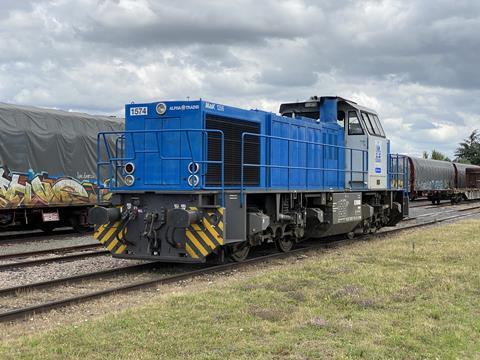
FRANCE: Start-up open access operator Railcoop aims to launch its first freight services later this year. If the co-operative’s plans come to fruition, Railcoop would follow up in 2022 with the launch of inter-city passenger services on the Bordeaux – Lyon via Périgueux route.
Railcoop said in January that its first freight trains would operate as shared services for companies in the northern part of the Occitanie region in conjunction with Mecanic Vallée, a cluster of about 250 businesses in the Occitanie and Nouvelle Aquitaine regions.
The first route would link Toulouse St-Jory with Figeac via Capdenac using a Vossloh four-axle G1206 diesel-hydraulic locomotive as motive power. Other routes being considered include Montauban – Brive-la-Gaillarde – Capdenac – Viviez-Decazeville. The co-operative cautions that its proposals depend on customers committing to use the service, but in the meantime it plans to file an application for paths before the end of March; it is already in discussions with SNCF Réseau.
The Bordeaux – Lyon passenger service would call at Libourne, Périgueux, Limoges, Saint-Sulpice-Laurière, Guéret, Montluçon, Gannat, Saint-Germain-des-Fossés and Roanne, with a provisional trip time of 6 h 47 min. Railcoop applied to the Autorité de Régulation des Transports to operate this service on June 25 2020. It also sought approval to run inter-city services between Toulouse and Rennes via Limoges, Tours and Le Mans and between Lyon and Thionville via Mâcon, Chalon sur Sâone, Dijon, Nancy and Metz.
Operational plans take shape
Initial plans for rolling stock would see Railcoop purchase a fleet of ex-SNCF X72500 DMUs which it would refurbish in time to start services in June 2022. In the meantime the co-operative is in discussions with Alstom, Siemens, Stadler and Titagarh Firema with a view to acquiring new rolling stock. Using Alstom’s Coradia Liner as an example, Railcoop calculates that it will need a fleet of nine trainsets. In contrast to earlier proposals by Flixtrain, which has now withdrawn from the French market, Railcoop plans to use its own drivers and traction services.
The next step planned for April will be to apply for paths for the Bordeaux – Lyon service, with confirmation expected by September. At the end of the year Railcoop plans to start setting up partnerships with other organisations in preparation for the launch of services. The first drivers and station staff would be recruited in early 2022.
Railcoop was set up as a not-for-profit co-operative company (société anonyme) in November 2019 and is structured as a ‘community interest group’ or SCIC (Société Co-opérative d’Intérêt Collectif).
As of January 19, Railcoop had 4 549 members who include individuals, companies and associations. Earlier in the month it had amassed capital amounting to over €1m, the aim being to reach €1∙5m by mid-2021. This would pave the way for applications to obtain an operating licence and safety certificate.
Railcoop has grouped its members into five sections: salaried staff, technical and financial partners, local authorities, individual beneficiaries and other beneficiaries classed as legal entities; all have voting rights at annual general meetings.
There are eight working groups whose roles include governance, membership, service plans for 2023, freight, local trains and branch lines; one group is dedicated to improving Railcoop’s profile in the Bordeaux area. Further groups are planned to cater for other work strands.
In a message sent to open a virtual event held on December 12 last year marking Railcoop’s first anniversary, Transport Minister Jean-Baptiste Djébbari described members of the co-operative as ‘pioneers’. He hoped other businesses ‘with similar enthusiasm’ would follow Railcoop as ‘there is plenty of room for more offers, more services and more comfort at the best cost, for the benefit of users, provinces and ecology’.

















